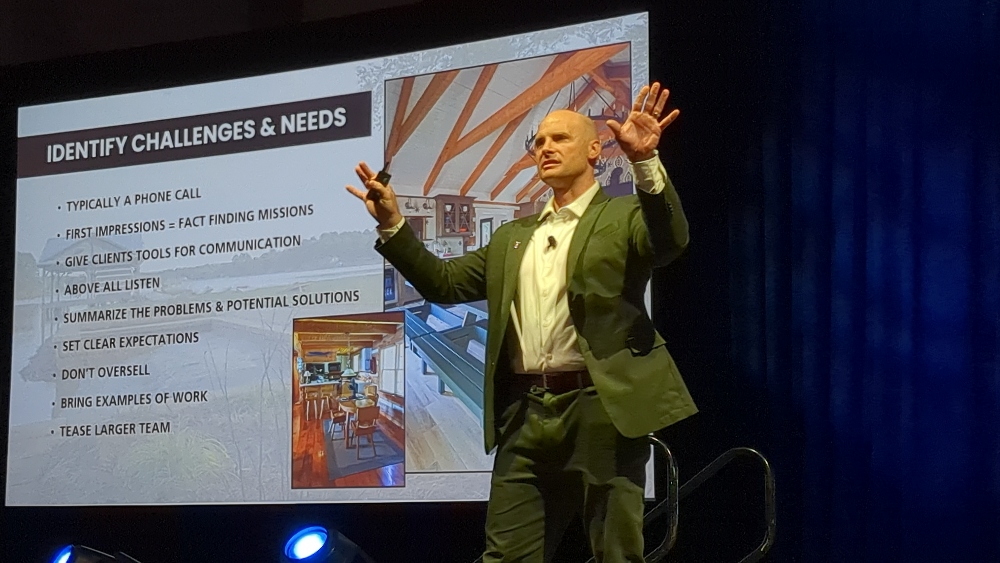At first glance, the keynote speaker for the 2025 CEDIA Expo may seem a bit detached from the category. An electrical engineer, designer and craftsman who rose to media prominence on HGTV and now runs his own production company, integrators may see themselves there in the entrepreneurial spirit Chip Wade embodies. However, throughout his keynote, Wade makes it clear that how he works with other trades may mirror that of integrators far more closely than originally expected.
Chip Wade: ‘Jack-of-all-Trades, Master of Some’
Where his direct technical experience might not quite match that of integrators, it’s his way of handling business and working on projects where Wade’s lived experience enters the realm of integration.
When taking to the stage for the keynote, Wade described himself as a “jack-of-all-trades and master of some” highlighting his tendency to learn as he goes on projects, pursuing jobs based on passion and interest versus what aligns perfectly with his technical skills.
It’s this approach to work that has allowed him to work on a variety of different jobs, while also gaining him plenty of notoriety within the industry by working alongside a multitude of different trade partners throughout the years.
Collaboration as a Force Multiplier
Remarkably, in describing the sheer diversity of projects Wade has worked, including his current work in production, he noted that he keeps a remarkably slim team, which, for someone who has his hands in so many interests, may seem at first to be impossible.
It’s at that point in the keynote, however, that Wade revealed perhaps one of his greatest skills: collaboration. Rather than always holding a sizeable team to cover every possible category Wade might work in, he instead excels at building and maintaining partnerships that complement and funnel into the work he is exceptionally skilled at.
At the same time, Wade is able to leverage those partnerships to secure more work, not just through references, but by being able to present to prospective clients and collaborators the sheer scope of work he is able to undertake thanks to his partners.
In fact, Wade described how he often lays out his full list of collaborators as being a part of what he can do on a job, even if his core skillset remains mostly in engineering and design. Wade even described bringing some of those members onto discussions with clients to help the client understand better what Wade can do through his network beyond his listed skillset.
It’s certainly a different mindset in some ways, one that leans more into that of an organizer and director versus a traditional boss/employee relationship, but in the scope of the design/build industry, it’s an approach that’s commonly leveraged, and one that can be seen as benefitting integrators quite well.
Where Integrators Fit Into the Picture
That idea of collaboration and agility speaks to the split many integrators might feel themselves being pulled in at times. Lighting and shading pulled integrators in that direction for a while, and now other areas, like energy, plumbing and even landscape lighting, are doing the same.
While some integrators took to lighting and scaled it up to be their defining business aspect, others have remained far more agile, working collaboratively with designers and electricians on projects to gain exposure to these project verticals, while still being able to focus on their core areas of expertise, such as controls or AV as an extension of lifestyle.
Stepping back to the aforementioned “smart plumbing” solutions, a common retort among integrators has been whether people are expecting them to learn plumbing. The same goes for networking and the requisite knowledge in IT often needed to create a truly exceptional system.
Wade’s take on it is if they’re willing to learn as you go and lean on industry experts, integrators can gain access to some truly exceptional projects where, while the entry point might be where they excel, the project can ultimately funnel into the integrator’s core area of expertise while giving them a new skillset along the way.
In a way, Wade’s presentation of collaboration during his keynote is its own unique form of business development and education for integrators looking to explore and expand into new verticals.
If his keynote is anything to go by, it has allowed Wade to better position those core skills he excels in, as well. An example of this he gave during the keynote was being able to focus more on presenting mockups of home environments with his skills he honed in working with CAD and other modeling software.
Integrators can view it in much the same way where, in working closely with lighting designers, an integrator more proficient in developing controls and automations can really be given the time to focus on delivering the best possible solution in that regard.
Wade’s Message: In a World of Experts, That ‘Jack-of-all-Trades’ Can Still Thrive
Overall, despite Wade noting that his approach to business might not work for all, the nature of collaboration and how he has leveraged it to the extreme to tackle projects he otherwise may never have touched if he stuck to his core technical skillset, speaks to position of many integrators out there today.






